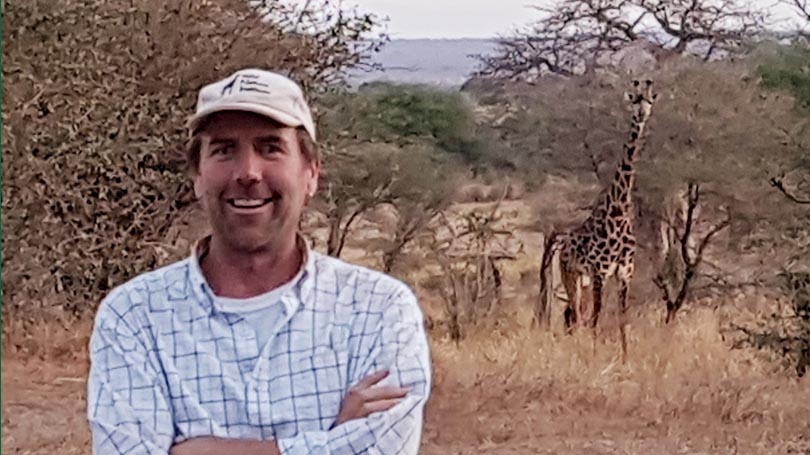
Derek Lee, Guarini '18, in Tarangire National Park, Tanzania conducting a giraffe population survey. (Photo courtesy: Derek Lee)
Nine years ago, Derek Lee was leaving a career in California to embark on a set of new, interconnected adventures: beginning a PhD at Dartmouth, studying giraffes in Tanzania, and starting a wildlife conservation nonprofit. We are delighted to share Lee’s success in these ventures!
A native of Lodi, California, Lee received his Bachelors in cultural anthropology from UC Santa Barbara. Degree in hand, he found a rhythm working seasonal jobs on charter boats and at desks through much of the 1990s, traveling the world each off-season. A lifelong interest in wildlife and outdoors recreation led him to pursue a Masters in wildlife management at Humboldt State University where he studied black brants—migratory birds similar to geese—as they passed through the Humboldt Bay. During this time, Lee discovered an aptitude for statistics, sparking a career of measuring and analyzing animal population dynamics.
Since completing his Masters in 2001, Lee has published dozens of peer-reviewed articleson the population dynamics of a menagerie of animals: every giraffe species, four rodent species, four bird species, three seal species, one salamander species, and one fish species. Many of these research projects measure the effects of even more animals—from sharks to wildebeests—on the focal species’ population dynamics. Early on, this work was done for Point Blue Conservation Science(formerly PRBO) and a host of other conservation organizations operating in California, including the University of California Cooperative Extensionand the National Oceanic and Atmospheric Administration.
The lessons learned during those years of professional development between completing his Masters and beginning his PhD at Dartmouth have their marks on Lee’s career. He still remains an active scholar of California spotted owl population dynamics, for instance, publishing peer-reviewed research as well as popular articleson the topic. Lee has also sharpened his survival skills through many harrowing research experiences in the field. While researching seals on the Farrallon Islands—a handful of rocks in the Pacific Ocean about 30 miles west of San Francisco—he was simultaneously responsible for everything from maintaining the boat and solar array to protecting his mental health while alone on an island for long periods of time. Lee brought these developing passions for long-term ecological study and remote-areas outdoorsmanship to bear on his dissertation research in Tanzania while at Dartmouth.
Upon arriving at Dartmouth in 2010, Lee became a teaching assistant for Field Methods in Ecology during summers in New England, then spent most of each year conducting a massive population survey of giraffe in the Tarangire-Manyara region of Tanzania. At the same time, Lee co-founded the nonprofit Wild Nature Institutewith his wife Monica Bond, herself an established wildlife scientist and currently a PhD candidate in Ecology at the University of Zurich, Switzerland. Lee was selected as a Fulbright Fellow in 2012 for his work monitoring the populations of ungulates—animals with hooves—in Tanzania.
Lee’s commitment to his work is deeply rooted in an ethics of care for fellow humans and the planet we share. "Long-term, many-year ecological studies are the only way we can hope to understand our ever-changing world. These studies are especially critical in the current period of rapid human-caused climate change. I have dedicated myself to providing and interpreting long-term data in the hope that we can save our planet and all its creatures, including ourselves" Lee says.
After receiving his PhD in 2015, Lee and Bond moved to Tanzania full-time to continue building Lee’s dissertation fieldwork into one of the largest giraffe population datasets in existence. These giraffe surveys take place three times a year, with a small crew bouncing along rugged roads for twelve hours every day for a month in search of giraffe to identify and record. Lee uses custom photo-identification software to match the pattern of spots on a giraffe’s right side to similar photos in a database to determine out which giraffe they have located, along with a GPS unit and laser rangefinder to record the animal’s exact location at that time. Lee has encountered no shortage of adventure since giving up fieldwork in California for fieldwork in Tanzania; the giraffe survey crew often goes to sleep to the lullaby of hyenas calls, or breaks camp in the middle of a pride of lions sleeping off the last previous night’s zebra feast.
In 2018 Lee became an Associate Research Professor of Biology at Pennsylvania State University. He and Bond now split their time between fieldwork while based in Arusha, Tanzania; Lee’s academic work in State College, Pennsylvania; and Bond’s academic work in Zurich, Switzerland. They have also started writing for children through lovable characters such as Lucky the Wildebeest (ebook in Maasai, Swahili, and English), Juma the Giraffe, and Doug Beetle (Twitter,Facebook), working to educate and empower the next generation of earth stewards and wildlife biologists.